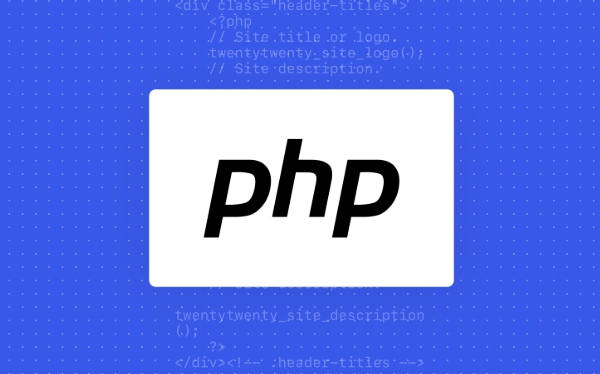Close the browser will not automatically destroy the PHP session, depending on the session configuration. 1. By default, PHP uses session cookies without expiration time. Close the browser will delete the cookie, but the server-side session data still exists until it is cleaned up by the garbage collection mechanism; 2. If the expiration time of the cookie is manually set, closing the browser will not delete the cookie, and the user can still resume the session the next time he accesses; 3. To ensure that closing the browser ends the session, the default behavior or explicitly clear the cookie and session data; 4. Server-side cleanup is not instant, and it depends on configuration parameters such as session.gc_maxlifetime and the garbage collection mechanism. Therefore, placing session settings rationally and implementing logout logic can effectively manage the session life cycle.

Closing the browser doesn't automatically destroy a PHP session — it depends on how the session is configured.

PHP sessions are usually managed using cookies, and whether closing the browser ends the session depends on whether the session cookie has an expiration time set. Here's how it works in more detail:
How PHP Sessions Work with Cookies
When you start a session in PHP using session_start() , the server creates a unique session ID for that user and sends it to the browser as a cookie. By default, this cookie is a session cookie , meaning it doesn't have an explicit expiration time and will be deleted when the browser is closed.

However:
- If you manually set an expiration time for the session cookie (using
setcookie()orsession_set_cookie_params()), then the session may persist even after the browser is closed. - The session data itself is stored on the server, and it's only removed after a certain amount of time passes without any activity (based on garbage collection settings).
What Happens When You Close the Browser?
-
If the session cookie is a temporary (session) cookie :
Closing the browser deletes the session ID from the client side. The next time the user visits the site, they'll get a new session ID, and the old session data will still exist on the server until it's cleaned up by the garbage collector.
If the session cookie has an expiration time (like for "Remember Me" features):
Closing the browser doesn't delete the cookie. When the user comes back, the same session ID is sent back to the server, and the previous session may still be active if it hasn't expired server-side.
So, simply closing the browser doesn't guarantee the session is destroyed — it just removes the way the browser remembers the session ID.
How to Make Sure a Session Ends When the Browser Closes
If you're building a login system and want sessions to end when the browser closes (for security reasons), here's what you can do:
- Don't set an expiration time on the session cookie.
- Use default PHP session behavior, which uses session cookies.
- Optionally, you can explicitly clear session data when the user logs out using:
-
session_destroy()– to delete session data on the server -
setcookie(session_name(), '', time()-1, '/')– to delete the session cookie on the client
-
This setup ensures that once the browser is closed, the session ID won't persist, and the user will need to log in again.
Server-Side Cleanup Isn't Immediate
Even if the browser is closed and the session cookie is gone, the session file or database entry on the server might not be deleted right away. PHP relies on a garbage collection process that runs occasionally.
Some things that affect cleanup:
- The value of
session.gc_maxlifetimein your PHP config - The probability and divisor values ??(
session.gc_probability,session.gc_divisor) - Whether the session storage mechanism supports automatic cleanup
In short:
- A closed browser often breaks the connection to the session, but doesn't always erase the session immediately.
- If you want to ensure sessions don't linger, implement proper logo logic and configure session settings appropriately.
Basically that's it.
The above is the detailed content of Does closing the browser destroy the PHP session?. For more information, please follow other related articles on the PHP Chinese website!

Hot AI Tools

Undress AI Tool
Undress images for free

Undresser.AI Undress
AI-powered app for creating realistic nude photos

AI Clothes Remover
Online AI tool for removing clothes from photos.

Clothoff.io
AI clothes remover

Video Face Swap
Swap faces in any video effortlessly with our completely free AI face swap tool!

Hot Article

Hot Tools

Notepad++7.3.1
Easy-to-use and free code editor

SublimeText3 Chinese version
Chinese version, very easy to use

Zend Studio 13.0.1
Powerful PHP integrated development environment

Dreamweaver CS6
Visual web development tools

SublimeText3 Mac version
God-level code editing software (SublimeText3)

Hot Topics
 How do I implement authentication and authorization in PHP?
Jun 20, 2025 am 01:03 AM
How do I implement authentication and authorization in PHP?
Jun 20, 2025 am 01:03 AM
TosecurelyhandleauthenticationandauthorizationinPHP,followthesesteps:1.Alwayshashpasswordswithpassword_hash()andverifyusingpassword_verify(),usepreparedstatementstopreventSQLinjection,andstoreuserdatain$_SESSIONafterlogin.2.Implementrole-basedaccessc
 How can you handle file uploads securely in PHP?
Jun 19, 2025 am 01:05 AM
How can you handle file uploads securely in PHP?
Jun 19, 2025 am 01:05 AM
To safely handle file uploads in PHP, the core is to verify file types, rename files, and restrict permissions. 1. Use finfo_file() to check the real MIME type, and only specific types such as image/jpeg are allowed; 2. Use uniqid() to generate random file names and store them in non-Web root directory; 3. Limit file size through php.ini and HTML forms, and set directory permissions to 0755; 4. Use ClamAV to scan malware to enhance security. These steps effectively prevent security vulnerabilities and ensure that the file upload process is safe and reliable.
 What are the differences between == (loose comparison) and === (strict comparison) in PHP?
Jun 19, 2025 am 01:07 AM
What are the differences between == (loose comparison) and === (strict comparison) in PHP?
Jun 19, 2025 am 01:07 AM
In PHP, the main difference between == and == is the strictness of type checking. ==Type conversion will be performed before comparison, for example, 5=="5" returns true, and ===Request that the value and type are the same before true will be returned, for example, 5==="5" returns false. In usage scenarios, === is more secure and should be used first, and == is only used when type conversion is required.
 How do I perform arithmetic operations in PHP ( , -, *, /, %)?
Jun 19, 2025 pm 05:13 PM
How do I perform arithmetic operations in PHP ( , -, *, /, %)?
Jun 19, 2025 pm 05:13 PM
The methods of using basic mathematical operations in PHP are as follows: 1. Addition signs support integers and floating-point numbers, and can also be used for variables. String numbers will be automatically converted but not recommended to dependencies; 2. Subtraction signs use - signs, variables are the same, and type conversion is also applicable; 3. Multiplication signs use * signs, which are suitable for numbers and similar strings; 4. Division uses / signs, which need to avoid dividing by zero, and note that the result may be floating-point numbers; 5. Taking the modulus signs can be used to judge odd and even numbers, and when processing negative numbers, the remainder signs are consistent with the dividend. The key to using these operators correctly is to ensure that the data types are clear and the boundary situation is handled well.
 How can you interact with NoSQL databases (e.g., MongoDB, Redis) from PHP?
Jun 19, 2025 am 01:07 AM
How can you interact with NoSQL databases (e.g., MongoDB, Redis) from PHP?
Jun 19, 2025 am 01:07 AM
Yes, PHP can interact with NoSQL databases like MongoDB and Redis through specific extensions or libraries. First, use the MongoDBPHP driver (installed through PECL or Composer) to create client instances and operate databases and collections, supporting insertion, query, aggregation and other operations; second, use the Predis library or phpredis extension to connect to Redis, perform key-value settings and acquisitions, and recommend phpredis for high-performance scenarios, while Predis is convenient for rapid deployment; both are suitable for production environments and are well-documented.
 How do I stay up-to-date with the latest PHP developments and best practices?
Jun 23, 2025 am 12:56 AM
How do I stay up-to-date with the latest PHP developments and best practices?
Jun 23, 2025 am 12:56 AM
TostaycurrentwithPHPdevelopmentsandbestpractices,followkeynewssourceslikePHP.netandPHPWeekly,engagewithcommunitiesonforumsandconferences,keeptoolingupdatedandgraduallyadoptnewfeatures,andreadorcontributetoopensourceprojects.First,followreliablesource
 What is PHP, and why is it used for web development?
Jun 23, 2025 am 12:55 AM
What is PHP, and why is it used for web development?
Jun 23, 2025 am 12:55 AM
PHPbecamepopularforwebdevelopmentduetoitseaseoflearning,seamlessintegrationwithHTML,widespreadhostingsupport,andalargeecosystemincludingframeworkslikeLaravelandCMSplatformslikeWordPress.Itexcelsinhandlingformsubmissions,managingusersessions,interacti
 How to set PHP time zone?
Jun 25, 2025 am 01:00 AM
How to set PHP time zone?
Jun 25, 2025 am 01:00 AM
TosettherighttimezoneinPHP,usedate_default_timezone_set()functionatthestartofyourscriptwithavalididentifiersuchas'America/New_York'.1.Usedate_default_timezone_set()beforeanydate/timefunctions.2.Alternatively,configurethephp.inifilebysettingdate.timez







